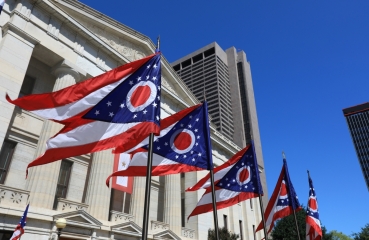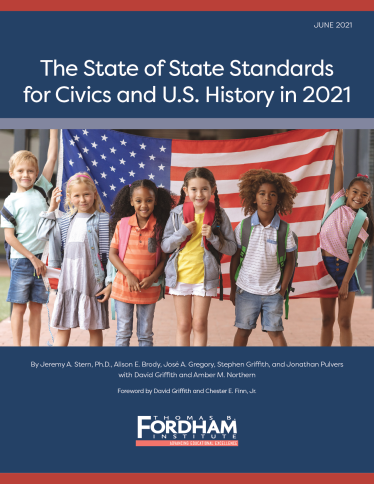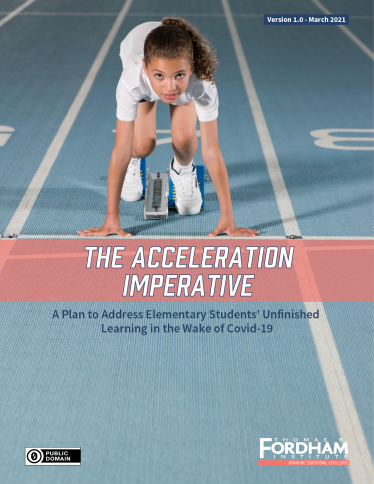Addressing constructive criticisms of Fordham’s report on state civics and U.S. history standards
David GriffithOur recent study of states’ U.S. history and civics standards attracted some constructive criticism from both the left and the right. It was, after all, explicitly bipartisan. Here are our responses to four critiques.
Using deeper learning to strengthen our democracy
Kent McGuireThe past eighteen months have been some of the most tumultuous in the history of our nation. The twin pandemics of Covid-19 and social injustice have highlighted how today’s students face very different expectations than students encountered in previous generations.
State civics and U.S. history standards are less politically biased than before. Let’s keep it that way.
Jeremy A. Stern, Ph.D.In 2020, as we began to look at state U.S. history standards for the first time since 2011, I was concerned about what we would find.
How not to write state standards for civics and U.S. history
Jeremy SmithAs discussed in Fordham’s new report, many states aren’t making the grade when it comes to their civics and U.S. history standards, which are often vague to the point of being meaningless.
Strong standards are vital for making history and civics central in K–12 education
Peter GibbonGone are the days when we could all agree with Ben Franklin’s sunny admonition: “Indeed the general tendency of reading good history must be, to fix in the minds of youth deep impressions of the beauty and usefulness of virtue of all kinds.” Instead, we must cope with political polarization, schools preoccupied with the achievement gap, students who learn from social media, and adults who are t
The Education Gadfly Show #777: O-H-I-O: School reform victories in the Buckeye State
5 things I’ve learned from teaching U.S. history to high schoolers
José A. GregoryI’ve taught U.S. history to high schoolers for almost twenty years, during which time I’ve worked in multiple states with students of varying personal and cultural backgrounds. Below are the five things that I think I’ve learned. 1) Our students need more exposure to U.S. history.
We need better civics education, but it won’t happen anytime soon
Dale ChuFordham’s new report found that twenty states have “inadequate” civics and U.S. history standards that need a complete overhaul. An additional fifteen states were deemed to have “mediocre” standards that require substantial revisions. This fits the lackluster showing of U.S. students on the NAEP exams in these subjects, and suggests that some schools barely teach this content at all. Unfortunately, the obstacles in the way of improving this sad state run up and down the line.
How to strengthen U.S. history and civics standards
Louise DubéFor our constitutional democracy to survive, much rests on our ability to resolve “…differences even as we respect them,” which is The State of State Standards for Civics and History in 2021 report’s definition of the social purpose of civic education.
The Education Gadfly Show #776: Can curriculum reform succeed where the rest of standards-based reform failed?
Proof that it’s possible to approach civics and U.S. history in a balanced way
David Griffith, Chester E. Finn, Jr.Is America a racist country? Or the greatest nation on earth? Or both or neither or some of each?
Teaching U.S. history and civics in America’s pluralistic society
John Wood, Jr.The Thomas B. Fordham Institute’s review of state standards for U.S. history and civics comes at a critical moment in American civic life.
The State of State Standards for Civics and U.S. History in 2021
Jeremy A. Stern, Ph.D., Alison E. Brody, José A. Gregory, Stephen Griffith, Jonathan PulversIs America a racist country? Or the greatest nation on earth? Such a divisive question leaves little room for the complexity, richness, and nuance of our country’s past and present. But it’s the sort of question that often seems to get asked in today’s polarized environment. Small wonder, then, that the tattered condition of civics and U.S. history education constitutes a national crisis.
First, do no harm: The initial impact of the Common Core on student learning
Victoria McDougaldEver since their creation and adoption over a decade ago, the Common Core State Standards (CCSS) have been hotly debated and intensely villainized. The backlash to the CCSS initially took many advocates and supporters by surprise, as state education standards have existed in the U.S.
The Acceleration Imperative: A Plan to Address Elementary Students’ Unfinished Learning in the Wake of Covid-19
In school districts and charter school networks nationwide, instructional leaders are developing plans to address the enormous challenges faced by their students, families, teachers, and staff over the past year. To help kick-start their planning process, we are proud to present The Acceleration Imperative, an open-source, evidence-based document created with input from dozens of current and former chief academic officers, scholars, and others with deep expertise and experience in high-performing, high-poverty elementary schools.
















